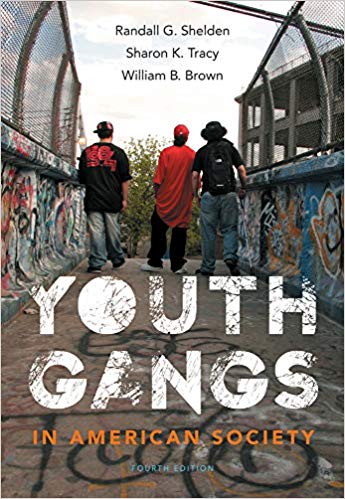Youth Gangs in American Society 4th Edition by Randall G. Shelden – Test Bank
Original price was: $55.00.$25.00Current price is: $25.00.
Digital item No Waiting Time Instant Download
ISBN: 1133049567 ISBN-13: 9781133049562
Authors: Randall G Shelden, Shelden, Tracy,
Sharon K Tracy, William B Brown, Brown
Publisher : Cengage Learning
Description
Youth Gangs in American Society 4th Edition by Randall G. Shelden – Test Bank
INTRODUCTION A BRIEF HISTORY OF GANGS
1. What Is a Gang and How Many Are There?
2. What Do Gangs and Gang Members Look Like?
3. The Gang Subculture.
4. Criminal Activities of Gangs.
5. Girls and Gangs.
6. Adult Gangs.
7. Why Are There Gangs?
8. Gangs in Context: Inequality in American Society.
9. Legal Responses to Gangs.
10. Community and National Intervention Strategies.
11. Conclusions.
CHAPTER 1
Test Bank
MULTIPLE CHOICE
- The dominant law-enforcement perspective is that gangs are essentially criminal conspiracies with:
- A large membership
- A few hard-core members
- A violent objective
- A large percentage of minorities
ANS: B REF: 24
- Which is not an element of a youth gang as defined by Huff?
- Frequently involved in illegal activity
- Interact with one another
- Are extremely violent in nature
- Associate themselves with a name
ANS: C REF: 25-26
- The main difference between a youth gang and an organized crime group as defined by Huff is:
- A better defined leadership
- Frequently involved in illegal activity
- Interact frequently with each other
- Are made of adults
ANS: A REF: 25
4.Which is not a descriptor of gang activity as defined by the text?
- Vice related activity
- Representation
- Retaliation
- Recruitment
- All are descriptors
ANS: D REF: 28-29
- Which is not a stereotype of a gang member according to the text?
- Are mostly males
- Mostly minorities
- Are mostly located in the inner-city
- All are stereotypes
ANS: D REF: 30
- The National Gang Center collects data on gangs in the United States. From where does the center get the data?
- School Districts
- Court records
- Police department
- Self-report surveys
ANS: C REF: 31
- From 1996-2008 there has been a _________ in the number of gang members?
- Increase
- Decrease
- Significant increase
- Sharp decline
ANS: B REF: 32
8.CRASH was a specialized gang unit created in the 1970’s by:
- The Chicago Police Department
- The New York Police Department
- The Los Angeles Police Department
- The Dallas Police Department.
ANS: C REF: 32
- What percentage of youth report being affiliated with a gang according to a self-report survey?
- 5-10%
- 10-15%
- 15-18%
- 19-20%
ANS: B REF: 33
- The largest reason for the growth of gangs according to the text is:
- Community social conditions
- Lack of enforcing minor juvenile laws
- Communities denying the gang problem
- Lack of after school activities for youths
ANS: A REF: 33-34
- The movement of gangs from one city to another is called:
- Migration
- Proliferation
- Expansion
- Enlistment
ANS: A REF: 34
12.According to recent studies, what area of the United States has experienced the largest gang migration?
- Northern
- Southern
- Eastern
- Western
ANS: D REF: 35
- According to the National Gang Center, which is not an element of a gang?
- Aged 12-24
- Identity to name/color/symbol
- Some organization
- Involved in criminal activity
- All are elements of a gang
ANS: E REF: 23
- “A group or collectivity of persons engaged in significant illegitimate or criminal activities, mainly threatening and violent” is the definition of:
- Traditional youth gang
- Street gang
- Posse
- Criminal organization
ANS: B REF: 24
- The terms “unsupervised peer groups” is another term for:
- Troublesome youth groups
- Traditional youth gang
- Street gang
- Posse
ANS: A REF: 27
16.Defacing of gang graffiti and passing through a designated gang territory, frequently a favorite hangout of a particular gang would be an example of which descriptor?
- Recruitment
- Vice-Related
- Turf-Violations
- Retaliation
ANS: C REF: 29
- If the criminal or victim has a gang affiliation, then the crime is considered to be?
- Gang related
- Gang motivated
- Member based
- Gang directed
ANS: A REF: 29
- Gangs can be found:
- In prisons
- In schools
- In cities
- All are locations of gangs
ANS: D REF: 31
- What location of gang activity fluctuates the most according to the text?
- On the streets
- Prisons and Jails
- Schools
- Rural
ANS: C REF: 31
20.A person who portrays themselves as a gang member when they are not officially affiliated with a gang is called:
- A wannabe
- A false banger
- A poser
- A fugasi
ANS: A REF: 36





Be the first to review “Youth Gangs in American Society 4th Edition by Randall G. Shelden – Test Bank”